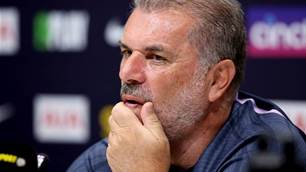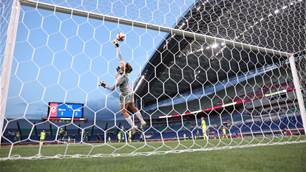Roman Abramovich cannot be accused of dawdling.
Luiz Felipe Scolari sacked on Monday. Guus Hiddink appointed Chelsea manager on Wednesday.
Even in the mad environment of football and the ruthless world of the Russian tycoon that is nifty work.
But do not expect Chelsea's problems to be solved quite so swiftly.
Not because Hiddink is not a sensible choice. Nor because he also has the little matter of coaching Russia to the 2010 World Cup.
The fact is Hiddink has done international and club jobs in tandem before with PSV Eindhoven and Australia with some success. He knows his way around international football and Europe. He was a European Cup winner in his second spell at PSV. He has a calm demeanour and a sharp football brain.
He also has a track record of coaxing the best out of under-performing players, most notably with his Russian experience in which he turned a dispirited bunch into a force capable of wrecking England's ambitions in qualifying for Euro 2008.
But Hiddink has never managed in the English Premier League. And perhaps never at a club like Chelsea where currently there seem to be so many disparate voices.
His first job when he arrives at Stamford Bridge later this week is obvious.
He must unite a dressing room which appears to have more cracks than a Roman ruin following the departure of Scolari.
That was obvious from captain John Terry's revelation that only "two or three players" supported the Brazilian coach.
Terry, Michael Ballack and John Obi Mikel have admitted that the players were to blame for Scolari's under-achievement. But does that mean all Chelsea's players are prepared to put in the hard yards which so many clearly were not doing under the Brazilian?
Can Deco rediscover his early-season form? Can Petr Cech reproduce the style which once made him the best goalkeeper in the Premier League?
Can Ballack be coaxed back to his best and Didier Drogba run about as if he cares?
Can Hiddink convince multi-millionaires that Chelsea is still the place to be if they want to win major trophies?
So often when a new manager is appointed there is an immediate effect, a 'dead cat bounce' as players seek to impress and improve their lot.
But this is not Harry Redknapp arriving at Tottenham with just two points from eight games and nowhere to go but up.
Chelsea are up against the big boys. Fourth in the Premier League table. Seven points behind leaders Manchester United having played a game more.
Currently locked in a dogfight with Arsenal for the place which would confer Champions League action next season if two pre-qualifying rounds could be negotiated.
Yet Hiddink's chances of success depend on more than the quality of the opposition around him. They depend on whether Abramovich allows him to do his job. Without meddling.
If Abramovich has sense to go with his money he will look at the way Martin O'Neill has been given free rein at Aston Villa, Arsene Wenger at Arsenal and, of course, Sir Alex Ferguson at Manchester United.
He will learn the lesson that football ownership, above all else, is about trust in the man who runs the team.
Whether Abramovich has accepted that, after sacking three managers in 12 months, is by no means certain.
Jose Mourinho apparently went because he would not accede to the owner's whims. Avram Grant was appointed essentially because he was a close ally of Abramovich while Scolari, coming from international management, also appeared to accede too readily to the wishes of the owner.
Hiddink is a fine manager. Wise and resourceful. And he and Abramovich clearly get along.
But that is not enough. His time at Chelsea will only be a success if Abramovich trusts him to do it his way. And his way alone.
endÍ
Even in the mad environment of football and the ruthless world of the Russian tycoon that is nifty work.
But do not expect Chelsea's problems to be solved quite so swiftly.
Not because Hiddink is not a sensible choice. Nor because he also has the little matter of coaching Russia to the 2010 World Cup.
The fact is Hiddink has done international and club jobs in tandem before with PSV Eindhoven and Australia with some success. He knows his way around international football and Europe. He was a European Cup winner in his second spell at PSV. He has a calm demeanour and a sharp football brain.
He also has a track record of coaxing the best out of under-performing players, most notably with his Russian experience in which he turned a dispirited bunch into a force capable of wrecking England's ambitions in qualifying for Euro 2008.
But Hiddink has never managed in the English Premier League. And perhaps never at a club like Chelsea where currently there seem to be so many disparate voices.
His first job when he arrives at Stamford Bridge later this week is obvious.
He must unite a dressing room which appears to have more cracks than a Roman ruin following the departure of Scolari.
That was obvious from captain John Terry's revelation that only "two or three players" supported the Brazilian coach.
Terry, Michael Ballack and John Obi Mikel have admitted that the players were to blame for Scolari's under-achievement. But does that mean all Chelsea's players are prepared to put in the hard yards which so many clearly were not doing under the Brazilian?
Can Deco rediscover his early-season form? Can Petr Cech reproduce the style which once made him the best goalkeeper in the Premier League?
Can Ballack be coaxed back to his best and Didier Drogba run about as if he cares?
Can Hiddink convince multi-millionaires that Chelsea is still the place to be if they want to win major trophies?
So often when a new manager is appointed there is an immediate effect, a 'dead cat bounce' as players seek to impress and improve their lot.
But this is not Harry Redknapp arriving at Tottenham with just two points from eight games and nowhere to go but up.
Chelsea are up against the big boys. Fourth in the Premier League table. Seven points behind leaders Manchester United having played a game more.
Currently locked in a dogfight with Arsenal for the place which would confer Champions League action next season if two pre-qualifying rounds could be negotiated.
Yet Hiddink's chances of success depend on more than the quality of the opposition around him. They depend on whether Abramovich allows him to do his job. Without meddling.
If Abramovich has sense to go with his money he will look at the way Martin O'Neill has been given free rein at Aston Villa, Arsene Wenger at Arsenal and, of course, Sir Alex Ferguson at Manchester United.
He will learn the lesson that football ownership, above all else, is about trust in the man who runs the team.
Whether Abramovich has accepted that, after sacking three managers in 12 months, is by no means certain.
Jose Mourinho apparently went because he would not accede to the owner's whims. Avram Grant was appointed essentially because he was a close ally of Abramovich while Scolari, coming from international management, also appeared to accede too readily to the wishes of the owner.
Hiddink is a fine manager. Wise and resourceful. And he and Abramovich clearly get along.
But that is not enough. His time at Chelsea will only be a success if Abramovich trusts him to do it his way. And his way alone.
endÍ
Copyright (c) Press Association
Related Articles

Postecoglou looking to A-League to 'develop young talent'
.jpeg&h=172&w=306&c=1&s=1)
Big change set to give Socceroos star new lease on life in the EPL













